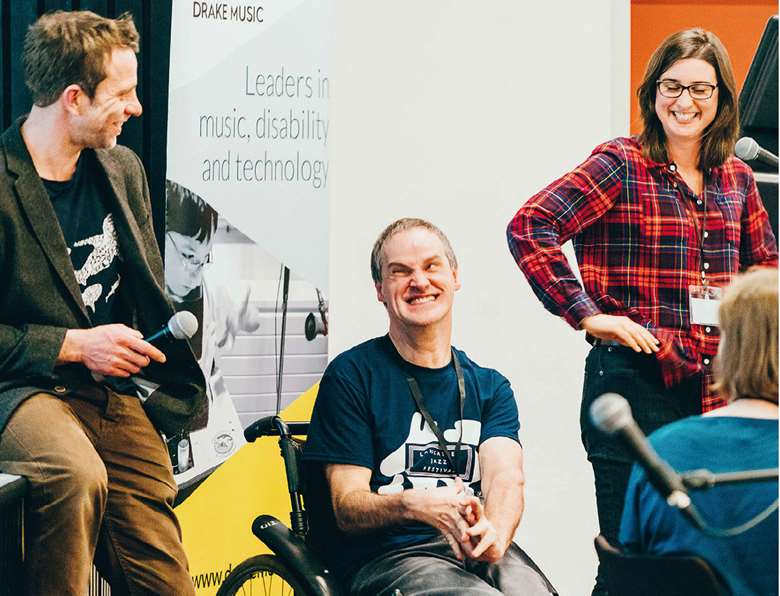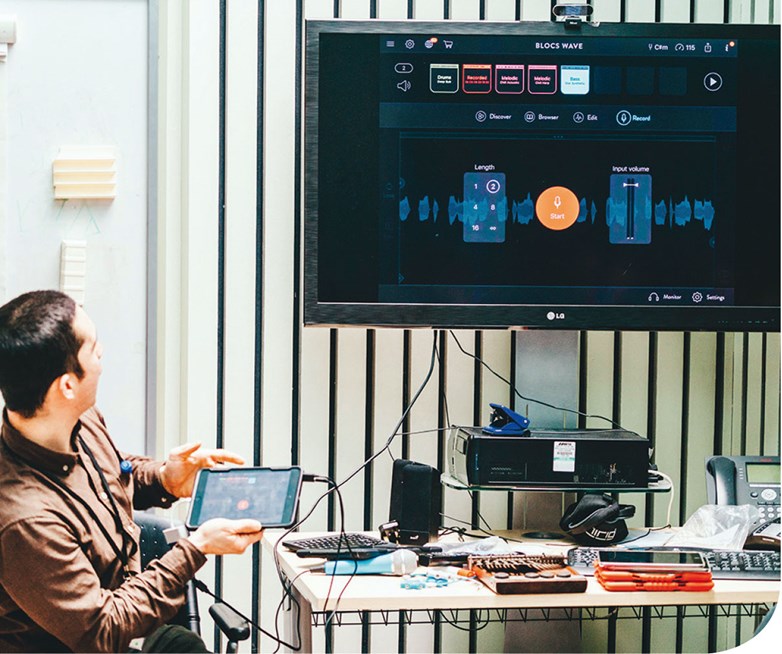Inclusive Technology: Drake Music CPD
Frances Jones
Sunday, September 1, 2019
Harnessing the immediacy and user-friendly nature of technology, Drake Music is opening new doors for young, disabled people in music. Frances Jones tells us more.

Henry Woodley
The use of technology in music teaching can be an area in which teachers feel they need greater expertise or resources, while delivering consistently inclusive lessons is an on-going target for many. Drake Music's new course, ‘Inclusion and Music Tech in Practice’, brings these two aspects together. It aims to give music educators the knowledge and confidence to use technology in order to deliver fulfilling musical experiences for young disabled people. I ask Becky Morris Knight, marketing associate at Drake Music, why the charity decided to run this course. ‘There's a demand’ she says, ‘We get asked about training a lot. We work in an area that is still seen as specialist.’
The course is delivered by two leaders, one of whom, as a minimum, is disabled. ‘It helps make it easier (for participants) to ask a question and get an answer that's based in real life’, says Morris Knight, ‘And disabled people are under-represented in the workforce.’ The course was designed by two colleagues at Drake Music, Daryl Beeton and Ben Sellers, and is aimed at music educators, from teachers in mainstream or special schools to those in music hubs or arts organisations. I ask Morris Knight how the course works. ‘In the morning we talk about the ethos – what is inclusion? We create a safe space so people can talk through stuff.’
Collaboration
The approach is underpinned by the Social Model of Disability, which invites creative and inclusive ways of working. ‘When we combine a tech training course with the theory of inclusion’ says Morris Knight, ‘that really embeds the learning.’ The afternoon is a practical session, where participants use technology to make music: ‘We set up iPads, or use a touch-board, which we wire up.’ Exactly how the session runs depend on the organisation that has booked the course, as well as the technology available and the requirements of the participants. The courses are delivered off site, at the school or music hub that has booked training. But, as Morris Knight points out, if a school doesn't have enough teachers to warrant running a course there, it is worth teaming up with a music hub. That way the costs are shared, and it is also an opportunity to meet fellow music educators, something that can be hugely beneficial and enjoyable for those who may be the only music teacher at their workplace.
Resources in schools and music hubs vary across the country, with some institutions being well equipped and trained in music technology and others less so. I ask Morris Knight how she would advise a school, with only limited music technology, to cater for its disabled students. ‘We work with them to understand what they have. There are ways you can build your own instrument – you can build one out of a circuit board and tin foil.’ Her passion for working with disabled young people comes through here, as she details lots of ways in which an institution can adapt with very little cost. ‘Set up a classroom differently,’ she says, ‘make the most of call and response – you can start with the voice and use a microphone.’
Mics, she explains, offer the immediacy of creating music to a disabled young person, and can be a great resource. Sometimes it's a question of training a teacher to use equipment that is already available. If there is more money available, iPads can be useful tools for creating music and Morris Knight is keen to point out a major advantage: they can be used by young people who have a very limited movement range. When working with disabled young people, the crucial point, she says, is fitting the instrument to the child, that way they are free to make music and take part in a creative process.
I ask her about the biggest challenges that Drake Music faces in its training and professional development work. Her response was immediate: ‘Funding! We know schools are under a lot of pressure and that there is demand but fitting it in can be difficult.’ I can sympathise with both sides; many schools are running very tight budgets, with cuts being made to staffing, resources and school trips, but it is also imperative that all young people, disabled and non-disabled, are able to access music. Training teachers and educators in the use of music technology helps to facilitate this access.
New horizons
Technology has opened up a world of possibilities in music education, and I ask Morris Knight to suggest a particularly exciting development. ‘The change in availability,’ she says, ‘Suddenly being able to go into a school with an iPad or being able to build an instrument for a particular child.’ She goes back to the idea of tailoring each experience and describes an account of a disabled child of five or six being given a specially made ‘tap-box’ which flashed a light and buzzed when the child tapped. It was a simple construction – in tapping the box she completed the circuit and made the buzzer sound – but the child could see that she had made that sound, that she was contributing.
Despite being a fairly new course, ‘Inclusion and Music Tech in Practice’ has already run several times and, according to Morris Knight, has been well received. She outlines a training day with peripatetic teachers in Newham, London, where the trainers offered two different practical sessions in the afternoon, one with iPads and one with touch-boards. ‘Then we all came together and played together’, she says. In reference to the morning's theory session, she adds: ‘People appreciate the opportunity, asking questions that they might otherwise feel awkward about.’ Courses like this can only lead to a better understanding of disabled young people, how to cater for them musically, and what they can achieve.
To find out more about ‘Inclusion and Music Tech in Practice’ and other courses, visit: drakemusic.org

© HENRY WOODLEY

